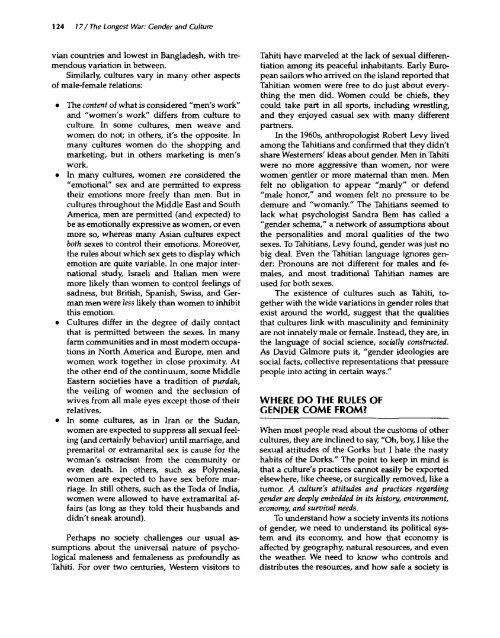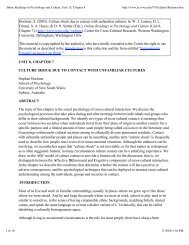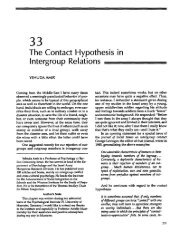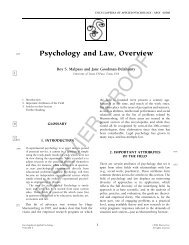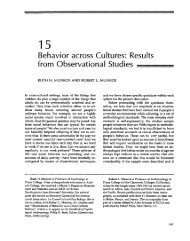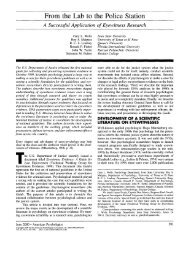The Longest War: Gender and Culture
The Longest War: Gender and Culture
The Longest War: Gender and Culture
You also want an ePaper? Increase the reach of your titles
YUMPU automatically turns print PDFs into web optimized ePapers that Google loves.
124 17/ <strong>The</strong> <strong>Longest</strong> <strong>War</strong>: <strong>Gender</strong> <strong>and</strong> <strong>Culture</strong><br />
vian countries <strong>and</strong> lowest in Bangladesh, with tremendous<br />
variation in between.<br />
Similarly, cultures vary in many other aspects<br />
of male-female relations:<br />
<strong>The</strong> content of what is considered "men's work"<br />
<strong>and</strong> "women's work" differs from culture to<br />
culture. In some cultures, men weave <strong>and</strong><br />
women do not; in others, it's the opposite. In<br />
many cultures women do the shopping <strong>and</strong><br />
marketing, but in others marketing is men's<br />
work.<br />
In many cultures, women ere considered the<br />
"emotional" sex <strong>and</strong> are permitted to express<br />
their emotions more freely than men. But in<br />
cultures throughout the Middle East <strong>and</strong> South<br />
America, men are permitted (<strong>and</strong> expected) to<br />
be as emotionally expressive as women, or even<br />
more so, whereas many Asian cultures expect<br />
both sexes to control their emotions. Moreover,<br />
the rules about which sex gets to display which<br />
emotion are quite variable. In one major international<br />
study, Israeli <strong>and</strong> Italian men were<br />
more likely than women to control feelings of<br />
sadness, but British, Spanish, Swiss, <strong>and</strong> German<br />
men were less likely than women to inhibit<br />
this emotion.<br />
<strong>Culture</strong>s differ in the degree of daily contact<br />
that is permitted between the sexes. In many<br />
farm. communities <strong>and</strong> in most modem occupations<br />
in North America <strong>and</strong> Europe, men <strong>and</strong><br />
women work together in close proximity. At<br />
the other end of the continuum, some Middle<br />
Eastern societies have a tradition of purdah,<br />
the veiling of women <strong>and</strong> the seclusion of<br />
wives from all male eyes except those of their<br />
relatives.<br />
In some cultures, as in Iran or the Sudan,<br />
women are expected to suppress all sexual feeling<br />
(<strong>and</strong> certainly behavior) until marriage, <strong>and</strong><br />
premarital or extramarital sex is cause for the<br />
woman's ostracism from the community or<br />
even death. In others, such as Polynesia,<br />
women are expected to have sex before marriage.<br />
In still others, such as the Toda of India,<br />
women were allowed to have extramarital affairs<br />
(as long as they told their husb<strong>and</strong>s <strong>and</strong><br />
didn't sneak around).<br />
Perhaps no society challenges our usual assumptions<br />
about the universal nature of psychological<br />
maleness <strong>and</strong> femaleness as profoundly as<br />
Tahiti. For over two centuries, Western visitors to<br />
Tahiti have marveled at the lack of sexual differentiation<br />
among its peaceful inhabitants. Early European<br />
sailors who arrived on the isl<strong>and</strong> reported that<br />
Tahitian women were free to do just about everything<br />
the men did. Women could be chiefs, they<br />
could take part in all sports, including wrestling,<br />
<strong>and</strong> they enjoyed casual sex with many different<br />
partners.<br />
In the 1960s, anthropologist Robert Levy lived<br />
among the Tahitians <strong>and</strong> confirmed that they didn't<br />
share Westerners' ideas about gender. Men in Tahiti<br />
were no more aggressive than women, nor were<br />
women gentler or more maternal than men. Men<br />
felt no obligation to appear "manly" or defend<br />
"male honor," <strong>and</strong> women felt no pressure to be<br />
demure <strong>and</strong> "womanly." <strong>The</strong> Tahitians seemed to<br />
lack what psychologist S<strong>and</strong>ra Bern has called a<br />
"gender schema," a network of assumptions about<br />
the personalities <strong>and</strong> moral qualities of the two<br />
sexes. To Tahitians, Levy found, gender was just no<br />
big deal. Even the Tahitian language ignores gender:<br />
Pronouns are not different for males <strong>and</strong> females,<br />
<strong>and</strong> most traditional Tahitian names are<br />
used for both sexes.<br />
<strong>The</strong> existence of cultures such as Tahiti, together<br />
with the wide variations in gender roles that<br />
exist around the world, suggest that the qualities<br />
that cultures link with masculinity <strong>and</strong> femininity<br />
are not innately male or female. Instead, they are, in<br />
the language of social science, socially constructed.<br />
As David Gilmore puts it, "gender ideologies are<br />
social facts, collective representations that pressure<br />
people into acting in certain ways."<br />
WHERE DO THE RULES OF<br />
GENDER COME FROM<br />
When most people read about the customs of other<br />
cultures, they are inclined to say, "Oh, boy, I like the<br />
sexual attitudes of the Gorks but I hate the nasty<br />
habits of the Dorks." <strong>The</strong> point to keep in mind is<br />
that a culture's practices cannot easily be exported<br />
elsewhere, like cheese, or surgically removed, like a<br />
tumor. A culture's attitudes <strong>and</strong> practices regarding<br />
gender are deeply embedded in its history, environment,<br />
economy, <strong>and</strong> survival needs.<br />
To underst<strong>and</strong> how a society invents its notions<br />
of gender, we need to underst<strong>and</strong> its political system<br />
<strong>and</strong> its economy, <strong>and</strong> how that economy is<br />
affected by geography, natural resources, <strong>and</strong> even<br />
the weather. We need to know who controls <strong>and</strong><br />
distributes the resources, <strong>and</strong> how safe a society is


